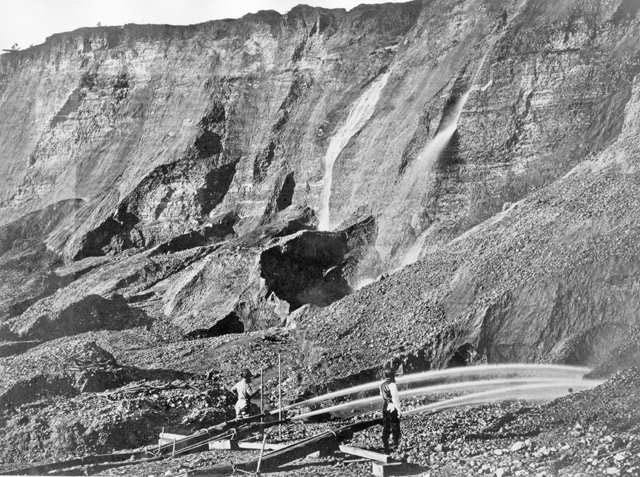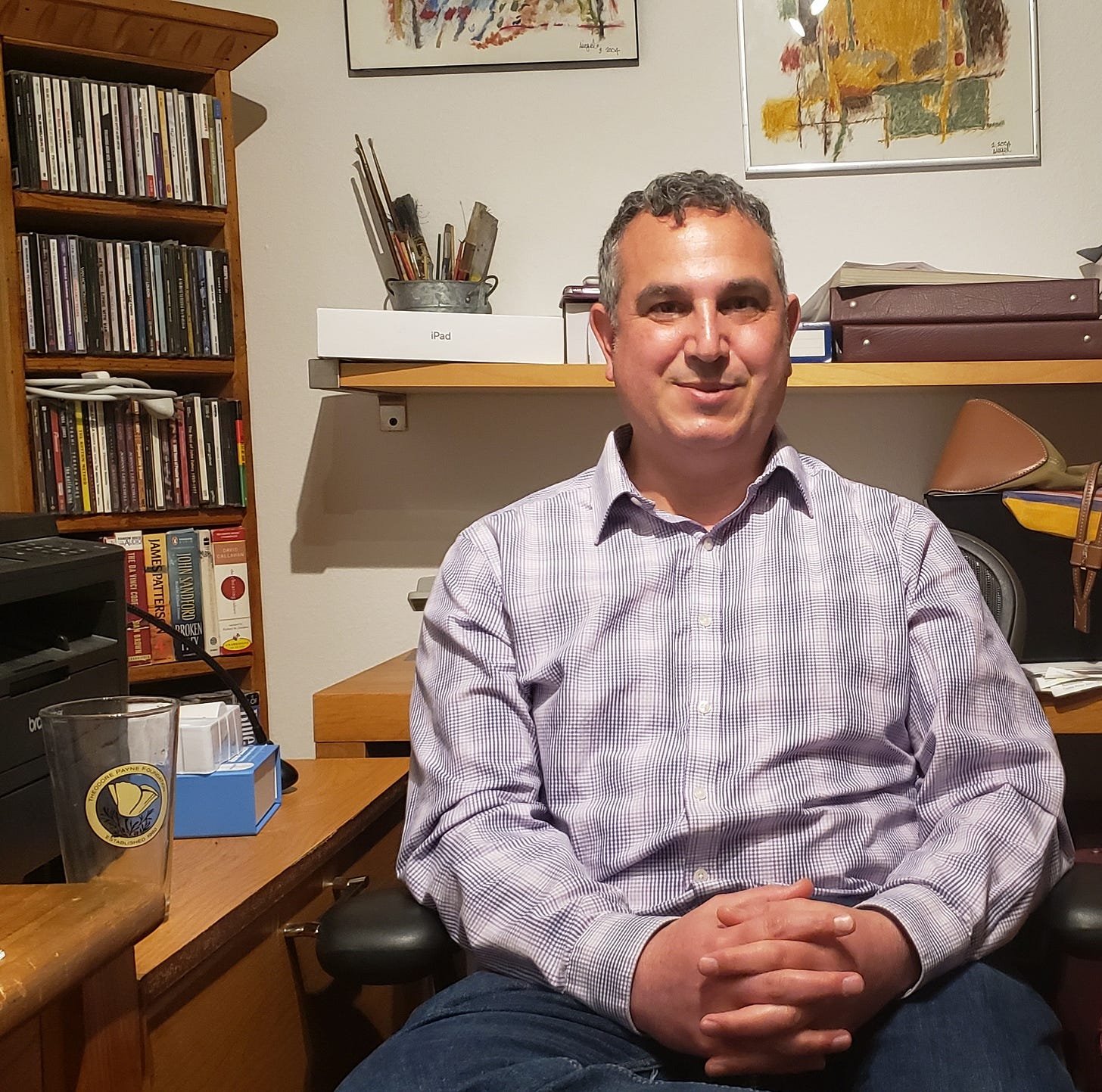[COPY] Scrap outdated and racist water-rights system, says Gov. Newsom's former water manager
California water rights are 'based on white colonial settlers stealing from and killing native people for land, water, and gold' says Max Gomberg
I’m reposting this interview in two parts to add context to my “We the People” series underway presently. Since it was published was first posted two years ago SoCal Water Wars has gained thousands of subscribers and followers, many within the past six months, who did not have a chance to read it. — JE
Max Gomberg served as a conservation manager for the California State Water Resources Control Board for ten years under Governors Jerry Brown and Gavin Newsom. Working there, he faced challenges from two historic droughts, climate change, and the pandemic.
Gomberg accuses Gov. Newsom of blocking policies that would promote the reasonable use of water and environmental justice by reallocating “resources to programs that actually increase public health and safety.”
This is the second of two parts from my recent interview with Gomberg. Part 1, “Gavin Newsom’s ‘culture of distrust’” was posted last week.
SoCal Water Wars: What do you think explains Gov. Newsom’s management approach? Is it a personality issue? Is he too close to special interests?
Max Gomberg: Here's what we know about Newsom. Newsom comes out of the San Francisco political dynasty of people like Nancy Pelosi, Dianne Feinstein, and Willie Brown. And the San Francisco political dynasty has lots of ties to agriculture, has sort of always been on the payroll, as it were. Newsom’s first business was a wine business.
My guess is that he heard from a lot of people that agriculture is under attack from the environmentalists. And a lot of his big campaign contributions come from people like the Resnicks. Is it that he’s a drinker of the Kool-Aide or that he just knows where the money comes from and believes if he’s appeasing Big-Ag it will help him if he runs for president? It’s all speculation, really.
The one thing that is clear is the actions he’s taken that, aside from the safe drinking water fund, have all benefited agriculture at the expense of the environment and affordability for the community.
The Resnicks, major promoters of the Delta Tunnel, have donated a total of $366,800 to Governor Gavin Newsom since 2018, including $250,000 to the campaign to fight the Governor’s recall.
Newsom received a total of $755,198 in donations from agribusiness in the 2018 election cycle, based on the data from www.followthemoney.org. That figure includes a combined $116,800 from Stewart and Lynda Resnick and $58,400 from E.J. Gallo, combined with $579,998 in the agriculture donations category. — From Sacramento News & Review
SoCal Water Wars: Let’s talk about water rights [in California]. The history of the current system of water rights is an ongoing legal battle between big land owners (ranchers and farmers) over profit and power using the complex legal mixture of appropriative and riparian rights. At the same time, all the local water districts in urban areas are obsessed with selling as much water as possible and supporting unhinged development.

Under these conditions, how can we create a water-rights system that respects environmental justice, promotes reasonable use, and properly addresses climate change?
Max Gomberg: Scrap the current system and develop a new one that is more equitable, responsive to climate change, and actually works for the 21st century reality that we're living in.
SoCal Water Wars: There seems to be a lack of will among local water districts to do that. They seem to prefer the same course that got us into the current climate-change mess in the first place. What would you do if you were governor?
Max Gomberg: The procedural way to do it is to pass a constitutional amendment. The key to understanding the water-rights system is the old saying that possession is nine-tenths of the law. The whole water-rights system in California is based on white colonial settlers stealing from and killing native people for land, water, and gold.
It [appropriation doctrine] established priority of use, not considerations of equity or justice, as the determinant of who got water [first] and how much. — Norris Hundley, The Great Thirst (2001)
When the state finally created a water-management framework in 1914, [colonial-based] existing water-rights practices were codified, ironically, based on seniority established [by force and common practice by settlers] since the gold rush of 1849, native Americans notwithstanding.
Riparian rights entitle the owner of the land bordering a surface water body (‘riparian land’) to use the water on his or her riparian land…Water under riparian right cannot be used on non riparian land. — Hannemann, Dykman, and Park in “Sustainable Water: Challenges and Solutions from California, edited by Allison Lassiter, 2015
That’s a terrible foundation for a legal system and it’s the way that our water-management system functions during periods of water scarcity: the people who were here first lose their water rights to those who came later.

So the whole system needs to go. There’s no reforming it. It needs to be abolished.
SoCal Water Wars: How do you abolish it?
Max Gomberg: It requires a campaign. Functionally, the way to do that is through a ballot initiative to amend the state's constitution. Replace the old system that never should have been there with a new system that gives top priority to ecosystems, native peoples, health and safety for domestic consumption, and food for people. At the very bottom of the priority list is almond exports—it’s the flip side of the water-rights system that exists now.
SoCal Water Wars: What about the concept of degrowth, meaning that CO2 reduction goals can’t be met without curbing economic growth to meet our needs instead of our greed?
Max Gomberg: It's about prioritizing needs instead of greed. It sort of goes back to the the Gandhi quote: “There's enough for everyone's need, but not for everyone's greed.”
It's not so much an issue of de-growth. It's an issue of equity. There are a very small number of people who are hoarding resources and wealth. And that gap has only grown here and abroad in recent years.
SoCal Water Wars: But, realistically, we can’t have perpetual development no matter how efficient we are with conservation.
Max Gomberg: There are limits. But the global issue we have is not one that is primarily driven by the number of the people on the planet. It’s driven by consumption, and energy use broadly speaking (which, of course, is tied to consumption).
SoCal Water Wars: Aside from population, it’s always about more profits, more development. Always more and more.
Max Gomberg: We need to set limits. And I think that there are countries that are sort of trying to do that. I don't think there's any great model out there yet. The problem is the fact that exploitation of the planet’s resources is not sustainable at its current trajectory.
Water conservation through turf replacement
SoCal Water Wars: The discussion between you, Tracy Quinn, and Fiona Sanchez in Water Dialogues about turf removal incentives got me thinking about my own community in south San Diego County. It turns out that few of the local water district’s ratepayers were aware of the district’s rebate programs. Plus, it’s in a low-income area and you have to pay up front.
The Sweetwater Authority board recently applied to the California Department of Water Resources for a $4.4 million grant that would assist ratepayers with turf replacement directly instead of through rebates. But looking at the potpourri of landscapes of the front yards in local neighborhoods it’s obvious that there is absolutely no plan in effect. Yet there are many potential ways to involve the homeowners to create water-saving landscapes.
Max Gomberg: Sure, but some water districts don’t want everyone else to know because, again, it’s about the money.
SoCal Water Wars: It’s about selling water.
Max Gomberg: That's right. And so, one of the points I've made is, look, we're finally seeing a recognition from the state that to solve the housing crisis you can't let every municipality do whatever they want. There has to be a statewide policy for water management like we have to create affordable housing, but we haven’t seen that yet. There is still an extreme deference to local decision making and every water district does whatever they want.
Governor Newsom’s resiliency plan
SoCal Water Wars: What about the Governor’s $8 billion water resiliency plan? Is there anything good in it?
Max Gomberg: Sure, there's some good stuff in there. We know that generally speaking, local water that's done responsibly is where we need to head, particularly for Southern California. That means recycled water, stormwater capture, desalination of brackish water—very different from seawater desalination. There's money in there for some of those things.
The problem at the state level is that there's still this fealty to large above-ground storage, infrastructure reservoirs and the big old/new Delta conveyance system that would siphon off more water down to San Joaquin Valley farms and Southern California. That’s money that could be used for local projects and conservation.
Unfortunately, we still have the state and regional entities like the Metropolitan Water District of Southern California planning for projects that have no place, like the Delta Tunnels.
Future pursuits
SoCal Water Wars: Now you are a consultant for various non-profits. I'm assuming that’s in sync with what you wanted to do when you worked for the state.
Max Gomberg: Yeah, it is. I'm working on climate and equity issues at the state and federal level. I'm working with a coalition of advocacy organizations, the Water Equity and Climate Resilience Caucus, specifically around low income water assistance to advocate for a more equitable federal investment in water.
At the state level, I'm working with different groups to encourage the state to move away from zombie water projects that never die but are clearly not in the interest of equity and the environment; specifically, again, thinking about the Delta Tunnel project. But also about surface reservoir and dam projects like Sites and Temperance Flat [respectively] that have no business being advanced.
I’m also supporting some groups that want to see more equitable investments made in water conservation itself; meaning, for example, turf removal rebates that don’t just go to wealthy homeowners, and more comprehensive assistance to lower-income households for indoor appliances and fixtures, landscape transformation, green spaces, and shade trees.
Related stories:





The largest user is agriculture, and the largest use there is alfalfa, mostly for dairy cows, and mostly for cheese. We're still subsidizing these farmers through the USDA and essentially free water. At a minimum, let's not do that.